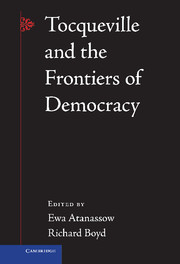Book contents
- Frontmatter
- Contents
- List of Contributors
- Short Title Abbreviations of Tocqueville's Major Works
- Acknowledgments
- Introduction: Tocqueville and the Frontiers of Democracy
- Part One The Meaning of Democracy and the Democratic Revolution
- Part Two Democratization in a Non-Western Context
- Part Three Challenges of Globalization: Democracy, Markets, and Nationhood
- Part Four Democracy, Imperialism, and Foreign Policy
- Part Five Democracy's Old and New Frontiers
- Epilogue: New Frontiers, Old Dilemmas
- Bibliography of Works Cited
- Index
- References
Epilogue: New Frontiers, Old Dilemmas
Published online by Cambridge University Press: 05 April 2013
- Frontmatter
- Contents
- List of Contributors
- Short Title Abbreviations of Tocqueville's Major Works
- Acknowledgments
- Introduction: Tocqueville and the Frontiers of Democracy
- Part One The Meaning of Democracy and the Democratic Revolution
- Part Two Democratization in a Non-Western Context
- Part Three Challenges of Globalization: Democracy, Markets, and Nationhood
- Part Four Democracy, Imperialism, and Foreign Policy
- Part Five Democracy's Old and New Frontiers
- Epilogue: New Frontiers, Old Dilemmas
- Bibliography of Works Cited
- Index
- References
Summary
As we have seen in preceding chapters, the concept of a “frontier” has multiple connotations. Some frontiers are tangible, referring to actual places or lines of demarcation, whereas others are purely metaphorical. In contemporary French, une frontière is literally a territorial border between nation-states. We usually think of political borders as concrete, identifiable lines on maps corresponding to geographical features such as rivers, mountains, or oceans. These natural barriers are often embellished by man-made checkpoints, guards, or walls. What could be more self-evident than, say, the border between Mexico and the United States or the frontiers of the European Union? And yet looking more closely we find that territorial borders between nation-states are historically unstable and frequently contested. One need only glance at maps of Europe from the seventeenth century to the present to appreciate just how susceptible national borders are to being redrawn.
Even when territorial boundaries are relatively static, however, the political frontiers between nation-states regulate the flow of populations, goods, capital, cultures, and discourses only imperfectly, if at all. International trade, technology, financial crises, and the forces of globalization render national borders increasingly porous. Linguistic, religious, and ethnic communities spill across national borders; refugees, clandestines, and criminals evade the most determined efforts at control. Observing these and related phenomena, many influential “cosmopolitan” critics such as Seyla Benhabib or Martha Nussbaum go so far as to conclude that national frontiers are losing significance in terms of how citizens of the world understand their identities and organize their lives.
- Type
- Chapter
- Information
- Tocqueville and the Frontiers of Democracy , pp. 332 - 340Publisher: Cambridge University PressPrint publication year: 2013



